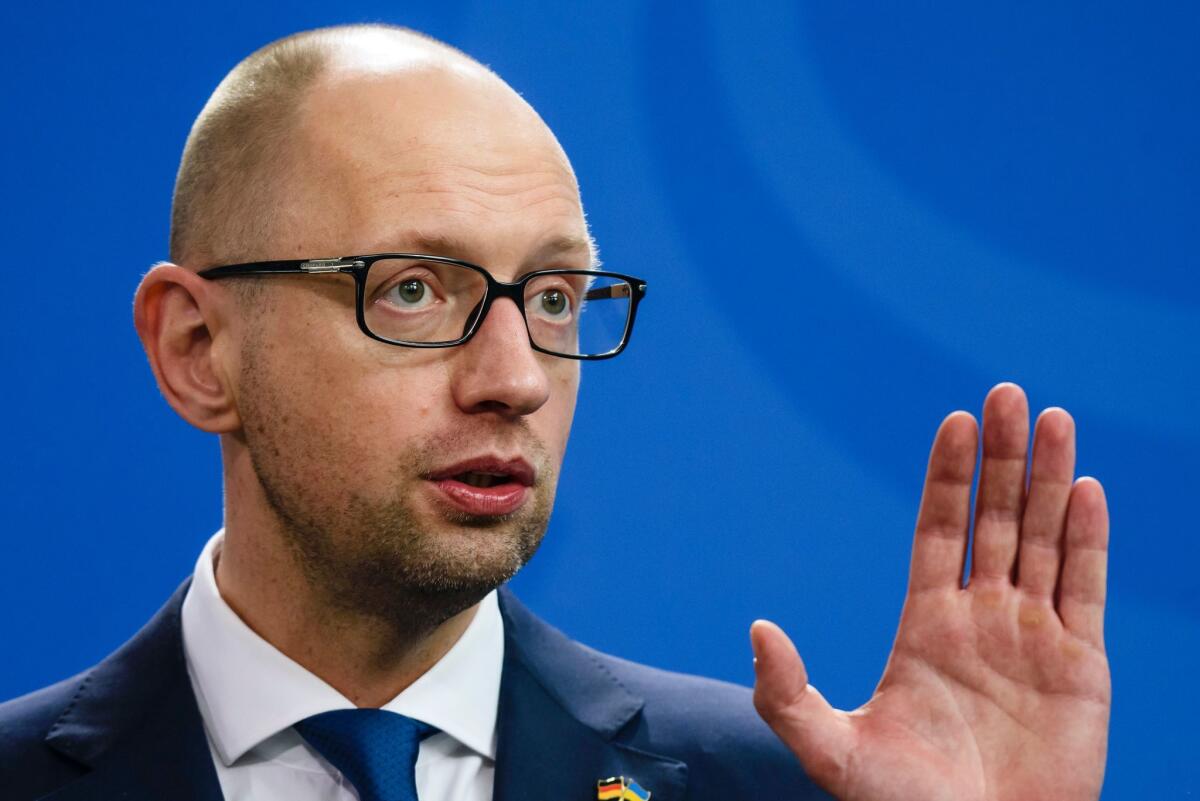Ukraine’s embattled prime minister resigns as corruption scandals shake Europe

Ukrainian Prime Minister Arseny Yatsenyuk has said his resignation would be formally submitted to parliament on Tuesday.
- Share via
Reporting from Moscow — Fallout from corruption scandals continued to roil Europe on Sunday, as Ukrainian Prime Minister Arseny Yatsenyuk announced that he would resign amid a growing political crisis.
His resignation came at a time when the country’s president, Petro Poroshenko, is under scrutiny after the Panama Papers suggested that he used an undisclosed offshore company to avoid taxes. Meanwhile, in Russia, one of the key figures named in the Panama Papers deflected accusations that he had helped enrich President Vladimir Putin’s inner circle through offshore deals.
In televised remarks, Yatsenyuk urged Ukraine’s political establishment to focus on pushing for long-needed reforms instead of chasing him out of office.
“My decision is based on several reasons,” Yatsenyuk said in his weekly television address. “The political crisis in the government has been artificially created, the desire to change one person has blinded politicians and paralyzed their will to bring about real changes in the country.”
Yatsenyuk, whose government came to power in 2014 following a popular uprising that ousted pro-Russian President Viktor Yanukovich, promised to fight endemic corruption and lead reforms, but has been increasingly criticized over cronyism and graft.
He said he would be replaced by parliament speaker Volodymyr Groysman and vowed to concentrate on forming a new ruling coalition that would start the disbursement of a $17.5-billion aid package from the International Monetary Fund.
Ukraine’s economy has been in freefall after years of political crises, Russia’s annexation of Crimea and the hostilities in the pro-Moscow eastern regions of Donetsk and Luhansk.
The appearance of Poroshenko’s name in the leaked Panama Papers documents only added to the political turmoil this month. Ukraine’s richest man came into office lambasting corruption and the shady deals of Ukraine’s oligarchs, but the documents from the Panamanian law firm Mossack Fonseca showed that he stashed hundreds of millions in offshore accounts.
In neighboring Russia, the Kremlin tried to whitewash the image of Putin’s best friend, a low-profile cellist whose name unexpectedly came up in the Panama Papers, and claimed that the U.S. State Department and the National Security Agency orchestrated the leak.
Sergei Roldugin is believed to own three companies that hid some $2 billion in offshore accounts, according to a string of investigative reports based on the leaked files.
In an interview with a state-owned Russian television station broadcast on Sunday, Roldugin said that he owns a business that helps him finance scholarships for young musicians and buy expensive musical instruments to donate to the state.
“I am glad I was hit” by the Panama Papers allegations, the stern-faced 64-year-old told the Vesti television channel while standing in an opulent hall of a czarist-era palace that his business helped restore. “There is nothing to catch. Everything is in the open. I am richer — I own Russia’s talents,” he said.
He said he has known Putin since the late 1970s and was a godfather to his elder daughter, Maria.
The show aired footage of Putin saying Friday that Roldugin was “a minority shareholder in one of our companies and earns some money.”
“This is, of course, not billions of dollars, that’s nonsense, nothing of the kind. [But he] earned some,” Putin told a news conference. “I am proud to have people like Sergei Pavlovich [Roldugin] among my friends.... Almost all of the money he earned he spent to purchase musical instruments that he brought to Russia.”
The news show framed the Panama Papers leak as an American-orchestrated conspiracy, in line with how it has been presented in dozens of reports on Russian national television — as an attempt by Putin’s critics, the liberal opposition, Ukrainian politicians and other foes of the Kremlin to weaken Russia.
Anchor Andrey Kondrashov suggested that the Organized Crime and Corruption Reporting Project (OCCRP), an international consortium of investigative reporters given access to the Panama Papers, was backed by U.S. Secretary of State John F. Kerry, the State Department and the NSA.
“During a [political] standstill, Americans in search of compromising materials on Putin were desperate to bite, at least, St. Petersburg, the city where Putin was born, where he, apparently, had his children baptized and where, of course, he has so many friends,” Kondrashov said. The State Department and the U.S. Agency for International Development spent $65.4 million in 2015 to support the freedom of information and independent media worldwide, and OCCRP was one of the recipients of the money, Kondrashov asserted.
“The NSA, the National Security Agency, is supplying materials for the information sewage of this nesting doll,” he said.
The broadcast ended with a complicated explanation of how Russian special services purportedly had to use offshore accounts in 2008 to buy a Russian telecom company that U.S. investors had been desperate to purchase in order to gain more clout in Russian media — and counter the Kremlin’s messages.
After the Americans failed to buy the telecom company, Kondrashov claimed, they concocted the Panama Papers scandal in order to explain their failure. He ended the show with the conclusion that the CIA “worked badly and messed with the wrong guys.”
Mirovalev is a special correspondent.
More to Read
Sign up for Essential California
The most important California stories and recommendations in your inbox every morning.
You may occasionally receive promotional content from the Los Angeles Times.










